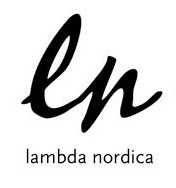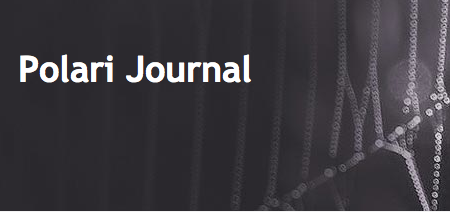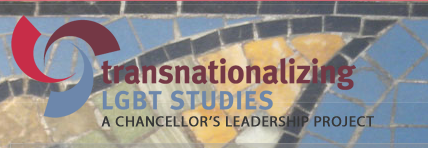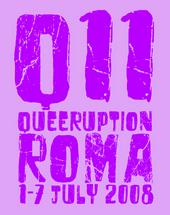Call for Contributions from Oslo Queer Festival
Monday, July 4th, 2011Read more on Oslo Queer Festival’s homepage!
Read more on Oslo Queer Festival’s homepage!

lambda nordica: Journal for LGBT Studies has sent out a call for contributions to a special issue on Crip Theory. NB! The deadline for abstracts is on May 1 2011:
*
Call for Papers for a Special Issue of lambda nordica: Crip Theory
Crip Theory is a new set of theories that analyses disability by using insights from queer theory, feminist theory and intersectionality studies. Crip theory is used to understand and influence attitudes and discourses concerning disability and impairment, but it has a much wider scope than that. Concepts like the normate, stigma, and accessibility can be used to study how an ableist society determines our mental structures.
Disability and impairment are key notions for an intersectional understanding of post modern society and can be used to analyse other concepts as citizenship, democracy, stigma and exclusion. In an effort to present the newest research in the field, lambda nordica: Journal for LGBT Studies is planning to publish a special issue on Crip Theory in the spring of 2012, and we are looking for abstracts with a crip perspective. The articles can be theoretical or empirical, but some aspect on Crip Theory should be thematised in each article. The focus will be on a Nordic context, in which we explicitly include the entire Baltic regiona. Abstracts and articles can be written in English, Danish, Norwegian, or Swedish.
Suggested topics include:
Disability politics and activism
Religion and disability
Class and disability
Sex and disability
Illness-Disability-Normalcy
Charity and disability
Disability and Citizenship
Gender and disability
Disability and identity
Age and disability
“The Crip Revolution” – Independent Living, agency, and citizenship
We are looking for abstracts of 300 words no later than 1 May 2011. Send them to guest editor Jens Rydström (jens.rydstrom (at) genus.lu.se. The articles should not extend 7,000 words and may be written in English, Danish, Norwegian, or Swedish.
*
lambda nordica is indeed the most important academic LGBTQ journal in the Nordic countries, so if are not already a subscriber, sign up right away here, or ask your local library to do so!

Call for papers til Kvinder, Køn & Forsknings temanummer om transkønnethed 3-4 2011
I 1991 udgiver Sandy Stone det berømte essay ‘The Empire Strikes Back: A Posttranssexual Manifesto’, der af mange betragtes som startskuddet til Transgender Studies. Manifestet er et modsvar til Janice G. Raymonds bog The Transsexual Empire: The Making of a She-Male fra 1979, i hvilken Raymond anklager Stone og andre transkvinder for at “voldtage kvinders kroppe” og transmænd for at være “forræderiske kvinder”. Stone tager til genmæle ved at betone vigtigheden af, at transkønnede begynder at tale på egne vegne og skrive deres egen historie. Samtidig opfordrer Stone til udviklingen af et analytisk sprog og en tænkemåde, der kan begribe transkønnethed på mere nuanceret vis.
Transstudier og transteori (Transgender Studies) opstår således som et forsøg på at vriste forskningen i og om transkønnethed ud af hænderne på de medicinske og psykiatriske eksperter og at gøre op med patologiseringen af transkønnede. Der opstår et tværdisciplinært forskningsfelt, der (gen)skriver historier og undersøger sociale og politiske forhold fra et transperspektiv. Teoretisk fokuseres der på det komplekse forhold mellem kropslige erfaringer og sociale/ institutionelle diskursiveringer af subjektivitet og køn.
Kvinder, Køn & Forskning dedikerer et dobbeltnummer til transforskningen. Temanummeret søger at præsentere den transforskning, som bedrives i eller med fokus på Danmark og Skandinavien netop nu, samt at inspirere forskere til at bruge transteori og -studier i deres eksisterende arbejder. Kvinder, Køn & Forskning er særligt interesseret i bidrag, der f.eks. centrerer sig om:
– Introduktioner til forskningsområdet og teorikomplekset.
– Transstudier og transteoris spændinger, overlapninger og fællesskaber med feministiske, queer og postkoloniale studier og teorier.
– Forholdet mellem transstudier og -teori og cyborg/teknofeminisme og ny materialisme med fokus på krop og materialitet.
– Intersektioner mellem race, køn, seksualitet, nationalitet, klasse, handicap mm. med udgangspunkt i transteori.
– Transnationale transkønnetheder. Globale analyser af transkønnethed. Hvordan ‘rejser’ og ‘oversættes’ transproblematikker og -studier mellem de globale akademiske, aktivistiske og politiske samfund og historiciteter?
– Analyser af transkønnede kulturelle repræsentationer og produkter inden for kunst, film, teater, litteratur mm.
– Analyser af transkønnede narrativer historisk og samtidigt.
– Analyser af transfobi. Hvordan kommer transfobi til udtryk historisk og i samtiden? Hvordan kan transfobi forstås? Hvordan forholder og forbinder den sig til andre fobier som sexisme, racisme, homo- og bifobi?
– Analyser af transkønnedes politiske og sociale forhold historisk og i samtiden inden for etablerede politiske systemer såvel som i aktivistiske og kunstneriske sammenhænge. Herunder undersøgelser af transkønnedes forhold til lægevidenskaben. Hvordan benyttes hormoner, kirurgi mm.? Hvordan opleves og analyseres lægevidenskaben og psykiatrien fra et transperspektiv?
Temaredaktionen for nummeret består af Tobias Raun (RUC) Maja Bissenbakker Frederiksen (KU) og Michael Nebeling Petersen (KU).
Deadline for indsendelse af abstracts: 15. april 2011. Abstracts bør fylde 1⁄2 – 1 side.
Deadline for indsendelse af artikler: 1. juni 2011. Artiklen må ikke fylde mere end 32.000 tegn.
Deadline for essays, debatindlæg og andre bidrag: 15. juli 2011.
Se skrivevejledning her og les mer på KKFs hjemmeside.

Here is a call for papers for a special issue of the creative writing journal Polari that looks interesting:
Special Issue of Polari Journal: Transverse
Open Call for Submissions
Polari Journal is currently holding an open call for submissions for a special issue (published online June 2011) featuring writing by transgender, transsexual, intersex, androgynous and genderqueer writers, artists, activists and commentators. Lesbian, Gay, Bisexual and Queer writers may also submit work that features trans characters, lives, culture, or issues.
The special issue will be entitled Transverse. The “verse” in the titles refers to poetry and prose, as well as to the notion of a transgender universe or world.
Polari Journal is an international, peer-reviewed journal. Polari tends towards the shorter forms: short stories, poetry, essays, one act plays/scripts, reviews, scholarly works, photography and visual art. In general, the word limit for fiction, plays and essays is 6000 words. Reviews should not be more than 1500 words. For poetry, the maximum is 100 lines. Review the Submissions Guide.
The Final Date for Submission is April 1st 2011.
Read more on Polari’s homepage.

Trikster has received this interesting Call for Papers about a conference in Madrid next year. The CfP is in English, Spanish, and French, and note: The deadline for abstracts has been extended to January 5, 2011.
LGBT/Queer Studies:
Toward Trans/national Scholarly and Activist Kinships
An International Conference
Madrid, Spain
July 3, 4, and 5, 2011
Keynote speakers:
– Zackie Achmat (Director, Centre for Law & Social Justice, Cape Town, South Africa)
– Sunil Gupta (Photographer, writer and curator, Delhi/London)
– Jin Haritaworn (Fellow, Helsinki Collegium for Advanced Studies, Finland)
– Beatriz Preciado (Professor, Université de Paris VIII, France)
(biographical information available on the website)
Note: Gay Pride is July 2 in Madrid
Organized by the LGBT Studies Program & Minor
Chancellor’s Leadership Project
Syracuse University
Syracuse, NY, USA
We invite scholars and activists to join in an exploration of the methods, possibilities, challenges, and dangers of doing LGBT/queer scholarship, activism, pedagogy, and curriculum in a transnationalized and technologically mediated world. We want to address the many challenges of understanding and responding to the complexly lived lives of queer subjects, as they are shaped by local and global upheavals and opportunities. What does the ‘transnational’ mean? How are queer lives rendered visible and legible and affectively accessible? What matrices of power make some queer figures more visible than others? What new forms of scholarship and activism emerge as people, images, ideas, and capital move in rapid, uneven, and complex ways across national borders? How might practices of kinships, however tense or contingent, happen? How does, or should, the transnational turn shape our pedagogies and curricula? And how do we connect and collaborate as scholars and activists across the globe? These are messy knowledges, nuanced knowledges, framed by the local and the global in complicated and often surprising ways.
We are interested in a truly global conversation, and encourage submissions about and from all over the world. We hope too to produce some form of publication out of the conference.
Possible topics:
Representing the complexities of everyday queer lives
Working with queer archives and memory
Analyzing gay imperialism
Designing pedagogies and curricula
Sustaining scholarly relationships across borders
Engaging with queer suffering and activism across borders
Studying legal and political responses to queer suffering
Queer media and literature
Exploring queer diasporas and homonationalisms
Writing queer histories
Analyzing queer labor and immigration
Responding to the challenges of translation and access
We invite scholars and activists to submit paper proposals (no more than 500 words) or complete panels (of no more than three papers) that address questions like these from various perspectives. English is the primary language of the conference, and we will accept submissions in Spanish and French. Please submit paper proposals or panel proposals electronically here.
Please feel free to contact Margaret Himley (mrhimley@syr.edu) or Andrew London (anlondon@maxwell.syr.edu), co-directors of the LGBT Studies Program and Minor at Syracuse University, for more information or with thoughts or questions about this conference/workshop. Read more here.
+++
Convocatoria: fecha límite 5 de enero, 2011.
LGBT/Estudios ‘Queer
Hacia afinidades trans/nacionales de investigación y activismo
Un congreso internacional
Madrid, España
3, 4, 5 de julio 2.011
Keynotes speakers:
– Zackie Achmat (Director, Centre for Law & Social Justice, Cape Town, South Africa)
– Sunil Gupta (Photographer, writer and curator, Delhi/London)
– Jin Haritaworn (Fellow, Helsinki Collegium for Advanced Studies, Finland)
– Beatriz Preciado (Professor, Université de Paris VIII, France)
Ojo: Orgullo Gai en España el 2 de julio en Madrid
Comité organizador: LGBT Studies Program & Minor
Chancellor¹s Leadership Project
Syracuse University
Syracuse, NY, USA
Invitamos a los académicos y activistas participar en la exploración de los métodos, posibilidades, desafíos y peligros de desarrollar el campo de investigación, el activismo, la pedagogía y el programa de estudios LGBT/queer en un mundo mediado por lo transnacional y la tecnología. Queremos destacar los desafíos múltiples de comprender y responder a las vidas multidimensionales de los sujetos queer, y la influencia de oportunidades y trastornos tanto locales como globales. ¿Qué significa lo transnacional? ¿Cómo se logra hacer visible y legible las vidas queer y cómo se vuelven accesibles? ¿Cuáles son las redes de poder que hacen que algunas figuras queer sean más visibles que otras? ¿Cuáles son nuevas formas de investigación y activismo que emergen cuando gente, imágenes, ideas y bienes cruzan de modo rápido, complejo y sin estabilidad las fronteras nacionales? ¿Cómo se puede lograr conexiones de afinidades, aunque sean tensas o contingentes? ¿Cómo formula o cómo se debe formular, lo transnacional nuestra pedagogía y programa de estudios? Y ¿cómo podemos conectar y colaborar internacionalmente como académicos, investigadores y activistas? Estas ideas son conocimientos desordenados, conocimientos matizados, marcados por lo local y global de maneras complicadas y, a menudo, sorprendentes.
Tenemos interés un una conversación verdaderamente global y animamos a todos proponer ponencias que representen todas partes del mundo. Esperamos también publicar las actas del congreso.
Temas posibles:
Representar la complejidad de las vidas cotidianas queer
Trabajar con el archivo y memoria queer
Analizar el imperialismo gai
El diseño de la pedagogía y los programas de curso
Sostener las relaciones académicas internacionales
Dedicarse al sufrimiento queer y el activismo multinacional
Estudiar decisiones y respuestas legales y políticos al sufrimiento queer
Literatura y prensa queer
Explorar la diáspora queer y lo homonacional.
Escribir la historia queer
Analizar el trabajo y la inmigración queer
Responder a los desafíos de la traducción y el acceso a la información
Invitamos a los académicos y los activistas proponer ponencias (máximo 500 palabras) o sesiones (máximo tres ponencias) que se indagan en estas preguntas de varias perspectivas. El Inglés será el idioma principal del congreso pero aceptaremos propuestas en Español y en Francés. Favor de entrgar las propuestas para una ponencia o una sesión eletrónicamente.
No duden en contactar a Margaret Himley (mrhimley@syr.edu) o a Andrew London (anlondon@maxwell.syr.edu), co-directores del Programa de LGBT Studies and Minor en Syracuse University, para más información o con ideas o preguntas sobre el congreso/taller.
+++
Appel à communications
Date limite: le 5 janvier 2011
Les études ‘LGBT/Queer’
Le ‘Trans/national’: vers des affinités activistes et intellectuelles
Un colloque international
Madrid (Espagne)
le 3,4, et 5 juillet, 2010
Keynote speakers:
– Zackie Achmat (Director, Centre for Law & Social Justice, Cape Town, South Africa)
– Sunil Gupta (Photographer, writer and curator, Delhi/London)
– Jin Haritaworn (Fellow, Helsinki Collegium for Advanced Studies, Finland)
– Beatriz Preciado (Professor, Université de Paris VIII, France)
Nous invitons chercheurs et activistes à participer à l’exploration des méthodes, des possibilités, des défis, et des dangers de la recherche, de l’activisme, de la pédagogie, et du curriculum ‘LGBT/Queer’ dans un contexte transnational dont la technologie sert de médiateur. Nous aborderons les défis qu’entraînent les tentatives de comprendre et répondre à la complexité de l’expérience vécue du sujet ‘queer’ à la fois bouleversé et favorisé par son mileu actuel, sur le plan global ou local. Quelle(s) signification(s) peut-on accorder au ‘transnational’? Comment la vie ‘queer’ atteint-elle la visibilité, la lisibilité, et l’accessibilité? Quelles matrices de pouvoir rendent certaines figures ‘queer’ plus visibles que d’autres? Quelles nouvelles formes de recherches et d’activisme se manifestent lorsque les gens, les images, les idées, et l’argent franchissent les frontières nationales de façon rapide, inégale, et complèxe? Comment de nouvelles pratiques de parenté, si tendues ou conditionnelles qu’elles soient, naîtront-elles? Comment le tournant ‘transnational’ influence-t-il la pédagogie et le curriculum? Ce sont des saviors à la fois embrouillés et nuancés, que le global et le local encadrent de manières complèxes et souvent surprenantes.
Nous nous intéressons à une vraie conversation globale, et invitons des communications qui proviennent du monde entier. Nous espérons éditer un volume de communications prononcées au colloque.
Thèmes proposés:
Représenter la vie quotidienne ‘queer’
L’archive et la mémoire ‘queer’
L’impérialisme gai
Les pédagogies et le curriculum ‘queer’
Encourager les relations scolaires qui franchissent des frontières
L’engagement contre la souffrance / l’activisme trans-frontières
Réponses politiques et légales contre la souffrance ‘queer’
Les médias et la littérature ‘queer’
Le diaspora ‘queer’ et les homo-nationalismes
Ecrire l’histoire ‘queer’
Le travail et l’immigration ‘queer’
La traduction et l’accès: défis et réponses
Nous invitons chercheurs et activistes de proposer (en 500 mots) une communication individuelle, ou bien une session complète de trois
communications de perspectives variées sur une question. L’anglais sera la langue principale du colloque, mais nous accepterons des propositions en français et en espagnol aussi. Veuillez proposer votre communication ou
votre session en ligne.
Les co-directeurs du programme d’études LGBT de Syracuse University voudront bien répondre à vos questions au sujet de ce colloque. Veuillez contacter Margaret Himely (mrhimley@syr.edu) ou Andrew London (anlondon@maxwell.syr.edu).
entzaubert is a radical queer D.I.Y. film festival, which will take place from 15 – 18 May 2008 in Berlin on the queer squatted truck site, schwarzer kanal.
The festival aims at creating a space for queer films, their directors and their audience. This is the second time the festival is organized, and it will be 4 days in the open air with films which question heteronormativity and capitalism, promote diversity and deconstruction of socially accepted constructions.
The organizers have published a call for contribution of movies within or beyond these categories:
D.I.Y., queer, non-commercial, documentaries, no-borders, arty, punky, anarchic, porn, trash, feminist, funny, serious, low-budget, no-budget, music, international, homo-socialist, homosexualist, revolutionary, poly-amourous, lazy, tranny-dyky, faggy, old, brand-new, provocative, difficult, hot, …
Deadline for submission is April 15.

The dates for the radical D.I.Y. queer gathering Queeruption is now released! This year the festival will be in Rome, and here is the invitation from the organizers:
“We are very pleased to announce the official dates for the next Queeruption. Queeruption 11 will be held in Roma this summer, 1-7 July 2008.
The collective in Roma is already working hard to ensure seven amazing days of queer radical culture, queer-politics, antiracism, zines, workshops, cinema, sexual health, cooking, sex spaces, art, eco-queer, music, human rights, theatre, queer cabaret, beach time, parties and more.
Queeruption11 will provide an alternative political, queer-anarchist, non hierarchic and a creative environment; queers of all sexualities are invited to gather together to this free event, plan your trip, get a sleeping bag and join us! You are welcome!
Italy right now faces some contradictory moments, where even a light version of civil partnership lies “within a fog”, homo-trans-phobia is normalised and the gay associations are covered with cob webs…not to mention the vatican… but there is a transgender MP sitting on the house of parliament… a sign of hope?
As you can all see there is plenty of room to discuss, promote diversity, encourage solidarity, share opinions and we are sure Queeruption11 will happen at the right time and place to shake some asses too!
Rome has a rich history of occupied buildings, D.I.Y activism, autonomous social centres, antifascist culture; so this can be a brilliant opportunity to diversify, build up confidence and momentum within Rome’s already growing queer scene.
The festival is a D.I.Y event and it can self sustain but it needs your participation, support and sharing; to create a radical alternative to the commercial “gay scene”.
So get involved! There will be a pre-program to help us organize and make the most of every day so please contribute with art-material, performances, & workshops. Email us to book your space!
Queeruption 11 is a self-funded festival, there will be some incurring costs for it to happen, although some benefits will be scheduled in Europe and Italy, to help alleviate the costs. All your assistance regarding the funding of Queeruption 11 is most welcome. Organize a benefits perhaps in your cities! Any feedback, comments and ideas are much appreciated.
Here are some of the ways by which to make contact with the Q11 collective in Roma:
Myspace / Queeruption homepage / email: